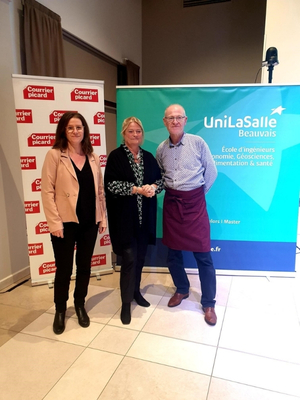The French government, through Mr. Barnier, recently announced that mental health would be one of its public policy priorities for the year 2025. This commitment translates into a clear desire to lift taboos and highlight the challenges of mental health in society. With this in mind, UniLaSalle Beauvais hosted a round-table discussion on Thursday November 7, organized by Le Courrier Picard.
In the form of a round-table discussion, experts from a variety of backgrounds expressed their views on four themes:
1. Lifting taboos and promoting mental well-being: A first step towards breaking down the stigma that still surrounds mental health, particularly among the younger generation.
2. Young people and the challenges of psychological health: A topical issue, given the health crisis and social isolation that increasingly affect young adults.
3. Prevention and management of psychosocial risks in the workplace: How companies can take charge of their employees' mental health and prevent the risks associated with stress and burnout.
4. Innovation and neuroradiology : technological advances in the treatment of mental disorders: A focus on scientific and technological advances in the treatment of mental disorders, particularly through neuroradiology.

Expert speakers at the heart of the debate
The evening was marked by contributions from leading figures in the field of mental health.
They shared their views:
- Marina Carrère d'Encausse, doctor and journalist, led the discussions with her expertise on the challenges of mental health in society.
"We have to stop dissociating physical and mental well-being. We are a whole." - Florence Prévost, Managing Director of Holicare, addressed innovative solutions for improving individuals' psychological well-being.
” 25% of employees show signs of anxiety and depression. The challenge is to detect the weak signals”. - Clément Duret, Head of the Occupational Pathologies Unit at Hôpital de Garches and Holicare Medical Director, discussed the challenges faced by healthcare professionals in dealing with psychosocial risks in the workplace.
" By proposing a holistic protocol to employees with weak signals, we achieve astonishing results. 9 out of 10 people regain a healthy lifestyle that gives them better mental health. - Professor Jean-Pierre Pruvo, Head of Neuroradiology at Lille University Hospital, presented recent advances in neuroradiology for the treatment of mental disorders.
“When you treat someone for a mental disorder, you're treating an entire family”. - Patricia Cocq, Head of Educational Mission and Student Life at UniLaSalle Amiens, shed light on the issues surrounding mental health among students and young professionals.
“Precariousness, poor sleep and academic pressure are realities that damage the mental health of some students”. - Professor Louis Jehel Psychiatrist and Professor of Psychiatry at the Université de Picardie Jules Verne (UPJV), Head of the Department of Psychiatry, Liaison Psychology, Addictology and Psychotraumatology at the Amiens-Picardie University Hospital.
"The challenge is to improve the image of mental health. The brain is a marvellous organ which is capable of repairing itself when the environment provides the messages of support it needs”.
And on this November 7, the day of prevention against bullying at school: "Today, young people's identity is what is said about them on social networks. We need to remind them of their value”.
This round-table discussion highlighted the need for a comprehensive and innovative approach to preventing mental health disorders, an area that is increasingly taken into account by society, but still too often neglected in public policy.
The campus event was part of this dynamic, encouraging the various players involved to reflect on and propose solutions for a more serene future, while exchanging views with a 350-strong audience sensitive to the subject.






